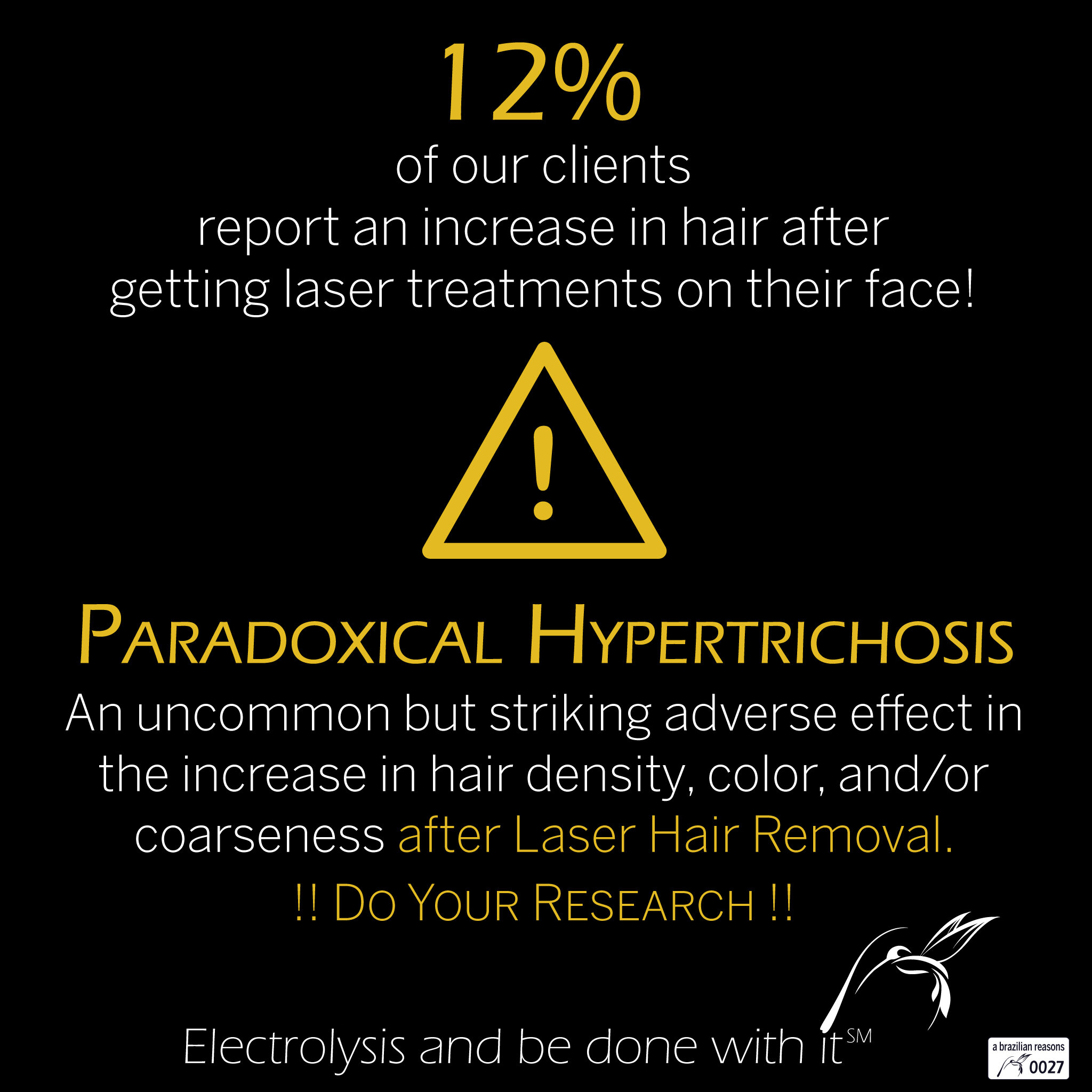Key Facts to Remember
Laser Companies Make False, Unchecked Claims
Laser hair removal (LHR) companies are NOT allowed to legally claim that the hair removal results are permanent, and yet, they do it anyway because the FDA does not police their claims.
They are only legally allowed to claim permanent reduction because permanent removal would mean never having to get LHR again after a prescribed treatment time that happens to be significantly shorter than forever (side-eye). Unlike, electrolysis, if you ever stop getting LHR, the hair treated will eventually grow back.
Laser Hair Removal Can Stimulate New Hair Growth
Thorough research has never been conducted by scientists to uncover why LHR causes paradoxical hypertrichosis ».
However, case studies have proven the possibility of this contraindication and called for more testing to understand: why it’s caused; why it’s more prone to occur on the faces and necks of women and the shoulders, back and chests of men; why it’s more prevalent in people with darker skin types, those with certain underlying hormonal conditions, and those taking corticosteroids or hormone supplements. View study »
Lasers Are Not One Size Fits All
The five most common types of laser, Alexandrite, Diode, IPL, Nd: YAG, and Ruby, are not all suited for every situation.
Some are better for certain skin types, specific hair colors and thicknesses. Some even perform better than others on different body parts, but there are still significant limitations and risks among them.
Make sure you understand the differences between the types of lasers and remember to ask your technician which is best for your circumstances.
Learn more about the types of laser » and whether you are a candidate »
SOMETHING ELSE TO KEEP IN MIND
While conducting your research, pay attention to how many times laser companies and laser professionals fail to mention electrolysis when referencing competing hair removal methods.
Most speak about waxing, tweezing, threading, shaving, and even at-home devices, but never about electrolysis. And if they do, they claim electrolysis is less effective, more dangerous and or more expensive than LHR; none of which is true.
Could it be because they just don’t want you to know about a more effective and less risky option?
We do believe there is a place for laser in the hair removal industry. However, the long-term effects of laser are inferior to the results achieved with electrolysis for these immediate reasons:
Electrolysis is 100% permanent once your treatment is complete which ultimately makes it cheaper over your lifetime. LHR does not last forever therefore payments for maintenance will never come to an end unless you are willing to risk hair regrowth.
Electrolysis has a 0% chance of increasing hair growth in or around treatment areas.
Electrolysis is safe for all hair and skin colors and conditions. It’s even safe for tattoos and those with densely freckled skin, vitiligo, and even moles with a doctor’s permission.
Electrolysis does require a special skillset which is why you should choose an electrologist that is licensed by the state within which they practice. If they practice in an unlicensed state, ensure they hold a CPE certification, offered by the American Electrology Association ».
The laser hair removal industry makes sure you don’t know these important key facts before you make the decision to choose their services.
Doctors and nurses are supposed to protect their patients and, in the least, be as transparent as possible so people can make an informed decision about their health; but instead, they are not telling you everything about laser hair removal and you have the right to know.
If you have been misled or misinformed about the permanence, and or the potential harms of LHR, stand up and demand the truth by signing the petition.
You can also file a claim with the Food & Drug Administration », the Federal Trade Commission », and the Better Business Bureau ».
“The truth will set you free, but first it will piss you off.”






